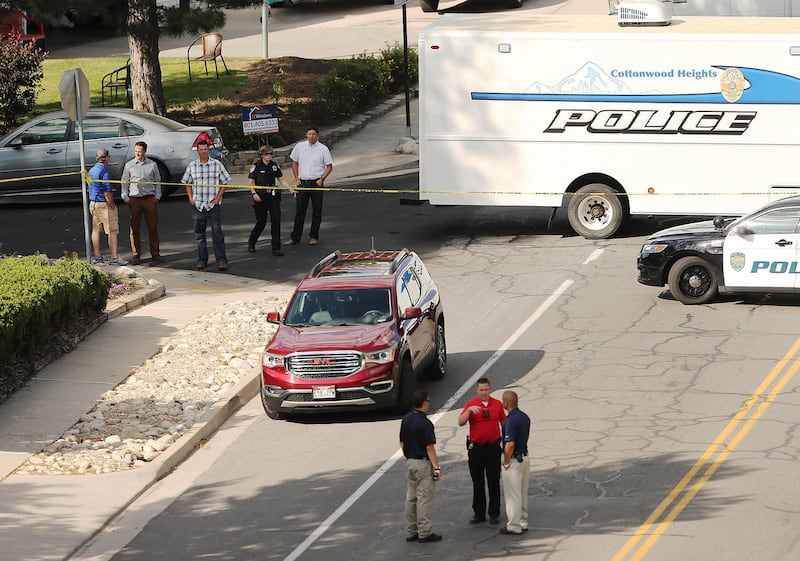We had just returned from high school graduation on June 6, 2017, when my daughter ran into our house with a chilling declaration. “Something is happening,” she said.
Opening the front door, I immediately heard the sirens converging on our neighborhood in Sandy, Utah. As we instinctively ran toward the commotion, neighbors yelled out to us, “There is a shooter.”
Children — celebrating the final week of the school year — were walking home when violence reigned. As frantic cries rippled up and down the street, adults desperately pulled schoolchildren into cars and homes. A few kids ran away; some hid. It would be hours before some parents and their children reconnected.
Police tape and emergency vehicles had already sectioned off the street when I learned that my friend, Memorez Rackley, 39, and her 6-year-old son, Jase — who had just completed kindergarten — were dead. As the final act of a tragic domestic attack and before turning the gun on himself, 32-year-old Jeremy Patterson had shot them. He also injured Memorez’s 11-year-old son and the 8-year-old daughter of a woman who tried to help the family.
My 74-year-old neighbor Kathy Peterson opened her home to that woman and her children, one who was also shot. The woman had pounded on Kathy’s door in the horrific moments after the attack. They locked the house and sat on the kitchen floor until help came. Kathy, who died five years later, was never the same.
As commotion buzzed around me, I stood behind the police tape doing the only thing I could.
I prayed.
That is what Kathy and those sitting on her floor did too. And it is what dozens of my neighbors did as they searched for their children and tried to make sense of the violence that had robbed us of peace.

The memories of that tragic day came flooding back to me one week ago when Robin Westman, 23, opened fire during morning Mass at Annunciation Catholic School in Minneapolis — killing two children and injuring 18 children and adults before committing suicide.
I remember the fear, the denial, the anger and the pain. And I saw some of those stages of grief again as political leaders, my colleagues and others tried to find meaning as yet another school shooting claimed children in the United States.
Former White House press secretary Jen Psaki and Minneapolis Mayor Jacob Frey both demanded action by attacking the sacred act of prayer.
“Prayer is not freaking enough,” wrote Psaki on X. “Prayers does not end school shootings. Prayers do not make parents feel safe sending their kids to school. Prayer does not bring these kids back. Enough with the thoughts and prayers.”
Their words — minimizing the sustaining power of prayer at a time when a majority of Americans still pray daily — are regrettable. This is not the time to debate between prayer and political action.
Our nation needs both.

Prayer strengthens believers from the inside out. A connection to God does not eliminate tragedy in our lives or the lives of others — but it certainly helps us endure it.
For me personally, accountability to God gives my life meaning and directs my focus outside of myself to my community and nation. It causes me to embrace virtues, to serve and, yes, to mourn with those that mourn.
There is also a place for political action after tragedy. Just as prayer heals souls from the inside out, government works to improve the lives of its citizens from the outside in.
State legislatures and the U.S. Congress must continue to debate the excruciating, difficult issues of gun control and Second Amendment rights and of mental health advocacy and support. School administrators must continue to intensely focus on how to keep children safe. The attorney general and even the Supreme Court must tackle issues of policy and protections.
That is what happened in my neighborhood after a man wielding a gun stole our innocence.
In early 2018, the Utah Legislature took action to strengthen laws on protective orders, stalking injunctions and pretrial release of alleged perpetrators to fix gaps in Utah domestic violence law that might have made a difference for my friend Memorez. The law went into effect May 8, 2018 — not even a year after her death.

And my neighbors and I also turned heavenward.
Two days after the tragedy, we gathered. Our mayor and over a dozen other community and religious leaders took turns at the lectern, encouraging us to remember what we had lost, seek help to work through grief and come together in order to heal.
Then we prayed and prayed again — in the tradition of many different faiths.
We left feeling a little better — having been reminded and reassured that God was aware of us and would continue to send his peace.
We also left feeling a little stronger — knowing that the same spirit that led my neighbors to pull children they did not know into their cars and homes as gunshots peppered our street, would carry our grieving community through the loss.
And we left feeling a little safer — believing that our government would work to address the issues that had made our community vulnerable.
That is the kind of prayer and action needed now in Minneapolis, a city desperate for both. Instead of a forced choice between the two, this is the better path forward: Legislation to help make our communities (and especially our children) less vulnerable, coupled with prayer to give us the inner strength to keep going in spite of senseless tragedy.


